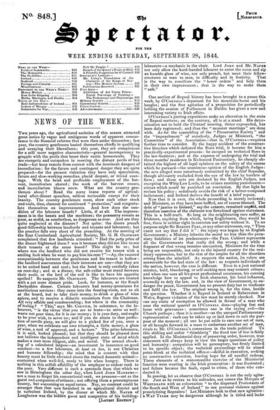NEWS OF THE WEEK.
Two years ago, the agricultural societies of this season attracted great notice by vague and ambiguous words of apparent concur- rence in the financial reforms that were then under discussion ; last year, the country gentlemen busied themselves chiefly in qualifying and unsaying their liberalisms; this year, they are conspicuous for a still more negative characteristic—general incompetency to grapple with the perils that beset their rustic homesteads. They are energetic and outspoken in meeting the distant perils of free trade—but keep remote from contest with the imminent dangers of incendiarism : for the future and contingent danger they are quite prepared—for the present visitation they have only speculation, future and slow-working remedies, placid despair, or trivial coax- ings. With the brisk and profitable employment of the har- vest, incendiarism abated ; the work of the harvest ceases, and incendiarism blazes anew. What are the country gen- tlemen about ? Read the many inane reports of agricul- tural after-dinner speeches, seldom noticeable except for their inanity. The country gentlemen meet, show each other stock and tools, dine, clamour for continued "protection," and congratu- late themselves on improvements. And how does the con- dition of the labourer benefit ? Little, if at all. The improve- ment is in the beasts and the machines; the peasantry remain as poor, as stolid, as comfortless, as dangerous as ever. And are they quite neglected at the dinners ? Not quite : the diners preach good-fellowship between landlords and tenants and labourers ; but the practice falls very short of the preaching. At the meeting of the East Cumberland Agricultural Society, Mr. G. H. OLIPHANT complained that few landlords attended : " Had the petty price of the dinner frightened them ? was it because they did not like to see their tenants at the same board? This might be so ; but where was the landlord who did not receive his tenant with a smiling look when he went to pay him his rent ? "—Ay, the vaunted companionship between the gentleman and his tenant is hollow : the landlord asseverates that their interests are one—that they are to be united hand and soul; but the hand is only cordially taken on rent-day ; and at a dinner, the salt-cellar must stand between their souls, or the lord of the soil is like to have his appetite spoiled ! So suspects Mr. OLIPHANT. The labourers are treated with a yet more distant pride. Look, for instance, at the South Derbyshire dinner. Certain labourers had money-premiums for meritorious services : they came into the feasting-room, not to sit at the board, but to take their money, to drink a glass of wine apiece, and to receive a didactic encomium from the Chairman. All very affable and condescending; but where is the community of tenting? "This," says Mr. COLYILE, in substance, to the la- bourers, "is the virtue that you are to learn—to serve us well : waste not your time, for it is our money ; it is your duty, and ought to be your wish, to serve us ; and if you do attain to that perfec- tion of servile piety, we will give to a picked few of you, once a year, when we celebrate our own triumphs, a little money, a glass of wine, a nod of approval, and a lecture." The prize-labourers, it is said, looked pleased; but that they should be pleased does not indicate the independent and intelligent state of mind which makes a man most diligent, able, and moral. The annual chuck- ing of a calculated largess—an investment in insurance on good conduct—to a few labourers, de haut en bas, is not Christian and humane fellowship ; the mind that is content with that bounty must be little elevated above the trained domestic animal— contented when well-fed, ready to bite when hungry. There is nothing in this selfish affability of the employer to endear rank to the poor.. Very different is such a spectacle from that which we saw in Birmingham the other day, when Lord JOHN MANNERS— not a man to forget his conventional rank, we presume—sat as the guest and companion ofartisans ; not offering them a presumptuous bounty, but conversing on equal terms. Nay, no contrast could be stronger than that now furnished in an agricultural district and in turbulent Ireland, by the dinner at which Mr. NAPER of Loughcrew was the bidden guest and companion of his building-
labourers—a mechanic in the chair. Lord JOHN and Mr. NAPES not only allow the hard-handed labourer to enter the room and sip an humble glass of wine, not only preach, but meet their fellow- creatures as man to man, in difficulty and in festivity. That is the way to conciliate the "lower orders" and help them in their own improvement ; that is the way to make them " safe."


























